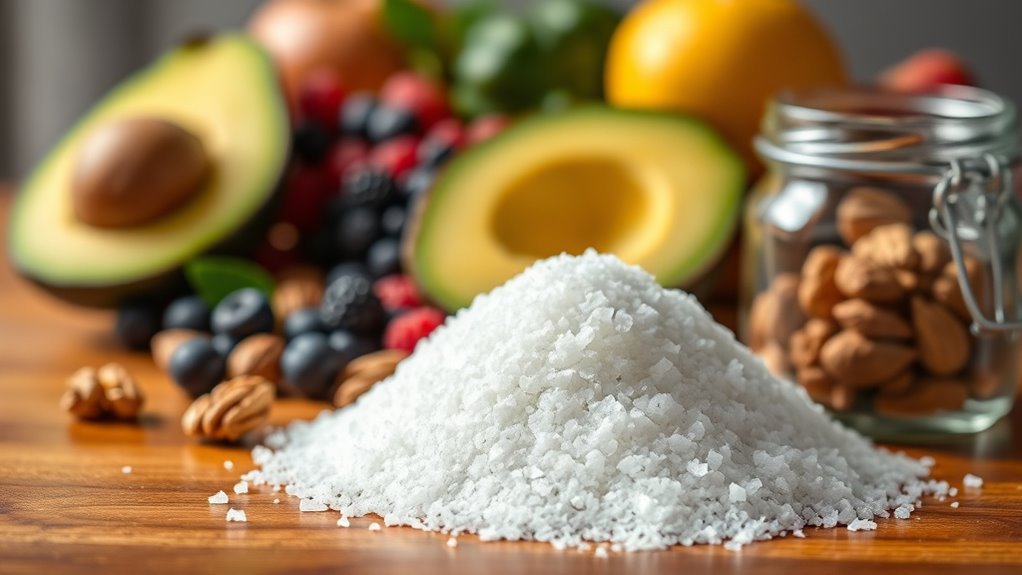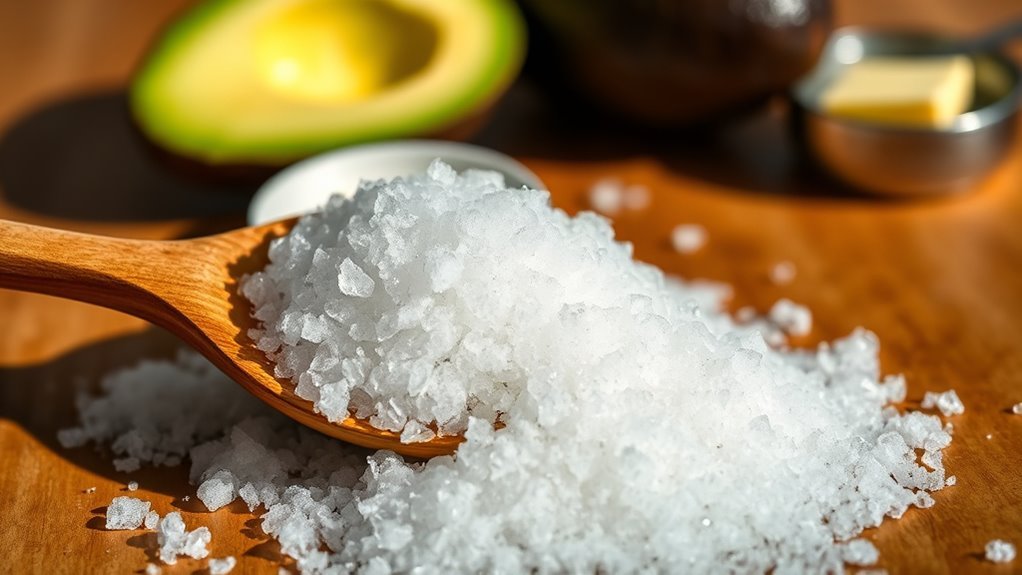Cane sugar isn’t keto-friendly due to its high carbohydrate content, which can disrupt ketosis and hinder your weight loss efforts. Consuming cane sugar leads to rapid blood sugar spikes, which may cause energy crashes and cravings. Instead, consider low-carb alternatives like stevia or erythritol, which can satisfy your sweet tooth without impacting ketosis. Understanding how different sweeteners affect your body can help you stay on track with your keto goals. There’s more to explore on this topic!
Understanding Cane Sugar: A Nutritional Overview

Cane sugar, often seen as a natural sweetener, plays a significant role in our diets. Understanding its cane sugar composition reveals that it’s primarily made up of sucrose, a disaccharide formed from glucose and fructose. This composition contributes to its sweetness and energy-providing properties. However, when considering its nutritional value, it’s important to note that cane sugar contains minimal vitamins and minerals, offering primarily empty calories. While it can enhance flavors in foods, excessive consumption can lead to health issues, such as obesity and diabetes. For those seeking a balanced diet, moderation is key. Recognizing cane sugar’s role allows you to make informed choices, empowering your nutritional freedom while enjoying its taste responsibly.
The Role of Carbohydrates in a Keto Diet

In a keto diet, understanding carbohydrate restriction is essential for maintaining ketosis. By limiting your carb intake to about 20-50 grams per day, you encourage your body to burn fat for fuel instead of glucose. This shift not only supports weight loss but also impacts your overall energy levels and metabolism.
Carb Restriction Principles
While many diets emphasize the importance of various macronutrients, the ketogenic diet uniquely prioritizes carbohydrate restriction to achieve its metabolic goals. By limiting carbs, you encourage your body to enter ketosis, where it burns fat for fuel instead of glucose. Carb counting becomes essential, as it helps keep your intake within the desired range, typically under 20-50 grams per day. This approach allows for flexibility in food choices, but you’ll want to explore sugar alternatives to replace traditional sweeteners without disrupting your carb limits. Options like stevia and erythritol can satisfy your sweet cravings while keeping your diet aligned with keto principles. Understanding these carb restriction principles empowers you to make informed dietary choices that support your health journey.
Impact on Ketosis
Carbohydrates play a pivotal role in determining whether your body remains in ketosis or reverts to burning glucose for energy. Consuming cane sugar can pose significant ketosis challenges due to its high carbohydrate content. When you ingest cane sugar, your body quickly converts it into glucose, which can kick you out of ketosis. This shift means you’ll lose the fat-burning benefits of being in a ketogenic state. While you might crave the sweetness, the cane sugar effects can undermine your goals. To maintain freedom in your diet, it’s essential to monitor your carb intake carefully. By choosing low-carb alternatives, you can enjoy satisfying flavors without jeopardizing your ketogenic lifestyle. Balancing your choices will help you stay on track.
How Cane Sugar Affects Blood Sugar Levels

Many people may not realize how cane sugar impacts blood sugar levels. When you consume cane sugar, it quickly enters your bloodstream, leading to a rapid spike in blood sugar. This triggers your body’s metabolic response, releasing insulin to help lower those levels. For some, this can result in an energy crash after the initial spike. If you’re on a keto diet, maintaining stable blood sugar is essential for staying in ketosis, as fluctuations can hinder fat-burning. It’s important to understand how cane sugar can disrupt this balance. While it may provide a quick source of energy, the subsequent drop can leave you feeling drained, affecting your overall energy and freedom to enjoy life fully.
The Importance of Ketosis for Weight Loss
Understanding the significance of ketosis is essential for anyone looking to lose weight effectively. When your body enters ketosis, it shifts from burning glucose to utilizing fat as its primary energy source. This metabolic state offers several ketosis benefits, including reduced hunger and increased fat oxidation, which can enhance your weight loss journey. By limiting carbohydrate intake, you encourage your body to produce ketones, which serve as an efficient fuel source. Many people experience improved energy levels and mental clarity during this process, making it easier to adhere to a weight loss plan. Embracing ketosis can provide the freedom to enjoy diverse food choices while still achieving your weight loss goals. Ultimately, understanding ketosis can empower you on your journey toward better health.
Alternatives to Cane Sugar on a Keto Diet
When you’re on a keto diet, finding suitable alternatives to cane sugar can help maintain your carb limits while satisfying your sweet tooth. Natural sweeteners and low-carb sugar substitutes not only provide sweetness but can also offer health benefits. Understanding these options can make it easier to stick to your keto goals without sacrificing flavor.
Natural Sweeteners Overview
While cane sugar is a staple in many diets, those following a keto lifestyle often seek alternatives that align with their low-carbohydrate goals. Natural sweeteners like stevia, monk fruit, and erythritol provide sweetness without the carbs. These options can satisfy your sweet tooth while keeping your body in a state of ketosis. Besides being low in calories, many natural sweeteners have health benefits, such as anti-inflammatory properties and improved gut health. They’re generally easier on your blood sugar levels, helping you maintain stable energy throughout the day. By choosing these alternatives, you can enjoy desserts and beverages without compromising your keto journey, giving you the freedom to indulge while prioritizing your health.
Low-Carb Sugar Substitutes
If you’re on a keto diet, you might be searching for low-carb sugar substitutes that can satisfy your cravings without knocking you out of ketosis. Fortunately, there are several low-carb options available. Stevia and erythritol are popular sugar substitutes that have little to no effect on blood sugar levels. Monk fruit is another excellent choice, providing sweetness without the carbs. Allulose, a lesser-known sweetener, is also gaining traction for its low glycemic index. These alternatives allow you to enjoy your favorite treats while adhering to your dietary goals. When using sugar substitutes, always check labels for hidden carbs, and consider your body’s response, as individual tolerance can vary. Enjoy the freedom to sweeten your keto lifestyle!
Sweetener Health Benefits
Although cane sugar is a common sweetener, it doesn’t align with the principles of a keto diet due to its high carbohydrate content. Fortunately, there are various sweetener types that can satisfy your cravings without derailing your nutritional goals. Options like erythritol, stevia, and monk fruit not only offer sweetness but also come with health benefits. Erythritol, for instance, has a low glycemic index and fewer calories, making it a great choice for blood sugar control. Stevia is natural and may even aid in weight management. Using these alternatives allows you to enjoy sweet flavors while maintaining ketosis, providing you with the freedom to indulge without compromising your health. Embracing these sweeteners can enhance your keto journey remarkably.
The Impact of Cane Sugar on Ketosis
Cane sugar can considerably disrupt ketosis, the metabolic state that many seek to achieve on a ketogenic diet. When you consume cane sugar, your body’s metabolism shifts, leading to increased insulin levels that can stall ketosis sustainability. Here are three key impacts of cane sugar on ketosis:
- Blood Sugar Spike: Cane sugar rapidly raises your blood sugar, pushing your body out of fat-burning mode.
- Insulin Response: The surge in insulin can inhibit fat oxidation, making it harder to maintain ketosis.
- Energy Fluctuations: As your body processes cane sugar, you may experience energy crashes, which can derail your keto journey.
Incorporating Sweeteners Into a Keto Lifestyle
While shifting to a ketogenic lifestyle often means cutting out traditional sugars, incorporating sweeteners can help satisfy your cravings without derailing your progress. Understanding different sweetener types can enhance your craving management effectively. Here’s a quick comparison:
| Sweetener Type | Keto-Friendly Level |
|---|---|
| Stevia | High |
| Erythritol | High |
| Monk Fruit | High |
These alternatives provide sweetness while keeping your carb intake low. They can also mimic the taste of sugar in your favorite recipes. Just remember, moderation is key. Experiment with these sweeteners to find what works best for you, allowing you the freedom to enjoy treats while sticking to your keto goals.
Tips for Managing Cravings on Keto
Managing cravings on a keto diet can be a challenge, especially when you’re used to the sweetness of sugar. To help with craving management, consider these strategies:
- Stay Hydrated: Sometimes, thirst can masquerade as hunger signals. Drink plenty of water throughout the day to stay hydrated and curb cravings.
- Incorporate Healthy Fats: Eating foods rich in healthy fats can help you feel fuller longer, reducing the urge to snack on sugary items.
- Mindful Eating: Practice being aware of your hunger signals. Before reaching for a snack, ask yourself if you’re truly hungry or just craving something sweet.
Real-Life Experiences: Keto and Sweetener Choices
How do different sweetener choices impact your keto journey? Your real-life experiences can vary considerably based on whether you opt for natural sweeteners like stevia or erythritol, or sugar alcohols like xylitol. Many find that these keto sweetener choices help satisfy their sweet cravings without kicking them out of ketosis. However, some people may experience digestive issues with certain sugar alcohols, which can be a setback. It’s crucial to monitor your body’s reactions, as individual tolerance can differ. Ultimately, experimenting with various sweeteners while paying attention to your personal responses can give you the freedom to enjoy sweetness without compromising your keto lifestyle. Choose wisely, and you’ll find the balance that works best for you.
Frequently Asked Questions
Can Cane Sugar Impact My Energy Levels on a Keto Diet?
Cane sugar can greatly impact your energy levels on a keto diet. When you consume it, your body experiences rapid energy fluctuations due to its high glycemic index. This can lead to a quick spike in blood sugar, followed by a crash, affecting your metabolic response. While you might enjoy a temporary boost, it’s likely to leave you feeling fatigued later. Staying mindful of your sugar intake is essential for maintaining consistent energy levels.
Is There a Safe Amount of Cane Sugar to Consume on Keto?
When it comes to consuming cane sugar on a keto diet, it’s essential to stick to keto guidelines. Generally, any amount of cane sugar can interfere with ketosis, so it’s best to avoid it altogether. Instead, consider sugar alternatives like stevia or erythritol, which can satisfy your sweet tooth without derailing your progress. Remember, the key to success is finding balance and maintaining your carb limits while enjoying the freedom of your dietary choices.
How Does Cane Sugar Compare to Artificial Sweeteners?
When comparing cane sugar to artificial sweeteners, it’s important to take into account their effects on your body. Cane sugar is a natural sweetener, providing quick energy but spiking blood sugar levels. In contrast, artificial sweeteners, like aspartame or stevia, offer sweetness without calories, often having minimal impact on your blood sugar. While they can be helpful for those seeking to reduce sugar intake, some people prefer the taste of cane sugar, valuing natural options.
Can I Use Cane Sugar in Baking While on Keto?
You can’t really use cane sugar in baking while on keto, as it’s high in carbs and can kick you out of ketosis. Instead, consider baking alternatives like almond flour or coconut flour. Sugar substitutes, such as erythritol or stevia, can provide sweetness without the carbs. They’ll let you enjoy your baked goods while staying true to your keto goals, giving you the freedom to indulge without the guilt.
What Are the Long-Term Effects of Cane Sugar on Ketosis?
Imagine your body as a finely tuned engine. When you introduce cane sugar into this system, its metabolism can disrupt the delicate balance needed for ketosis sustainability. Over time, frequent sugar intake might lead to a reliance on glucose instead of fat for fuel, making it harder to maintain your state of ketosis. If you’re seeking freedom in your dietary choices, consider the long-term effects of cane sugar on your journey.
Frequently Asked Questions about Cane Sugar and Keto
1. Is cane sugar considered keto-friendly?
No, cane sugar is not considered keto-friendly. The ketogenic diet is a low-carb, high-fat diet that restricts carbohydrate intake to promote ketosis, a metabolic state where the body burns fat for energy instead of carbohydrates. Cane sugar is high in carbohydrates, with one teaspoon containing about 4 grams of sugar, which can quickly exceed the daily carb limit for most individuals on a keto diet.
2. What are the alternatives to cane sugar for a keto diet?
There are several alternatives to cane sugar that are considered keto-friendly. These include natural sweeteners like stevia, erythritol, and monk fruit. These substitutes have little to no carbohydrates, making them suitable for maintaining a state of ketosis. Additionally, they provide sweetness without spiking blood sugar levels, which is crucial for those following a ketogenic lifestyle.
3. Can I use cane sugar in moderation on a keto diet?
While some individuals may choose to use cane sugar in moderation, it is generally not recommended on a strict keto diet. Even small amounts can add up quickly and potentially disrupt ketosis by increasing carbohydrate intake. If you do choose to indulge, it’s important to account for the carbs in your daily limit and adjust other food choices accordingly.
4. How does cane sugar affect blood sugar levels?
Cane sugar can cause a rapid spike in blood sugar levels due to its high glycemic index. This spike can lead to an insulin response, which is counterproductive for those on a keto diet seeking to stabilize their blood sugar and insulin levels. Keeping blood sugar levels low is essential for achieving and maintaining ketosis, making cane sugar an unsuitable choice for those on this diet.
5. Are there any health benefits to using cane sugar over other sweeteners?
Cane sugar does have some benefits over artificial sweeteners, such as being a natural source of energy and containing trace minerals. However, these benefits are outweighed by its high carbohydrate content, which makes it unsuitable for a keto diet. For those not on a strict keto regimen, moderate consumption of cane sugar can be part of a balanced diet, but it is advisable to prioritize healthier sweetener alternatives that align with keto principles.
References
- https://www.healthline.com/nutrition/can-you-eat-sugar-on-keto
- https://www.ncbi.nlm.nih.gov/pmc/articles/PMC7075975/
- https://www.cdc.gov/diabetes/library/features/truth-about-sugar.html
- https://www.mayoclinic.org/healthy-lifestyle/nutrition-and-healthy-eating/expert-answers/can-i-eat-sugar-on-a-keto-diet/faq-20421873
- https://www.webmd.com/diet/what-is-keto-diet
- https://www.bbcgoodfood.com/howto/guide/what-keto-diet
- https://www.medicalnewstoday.com/articles/what-is-the-ketogenic-diet
- https://www.journalofnutrition.org/
- https://www.usda.gov/topics/food-and-nutrition
- https://www.nutrition.gov/


